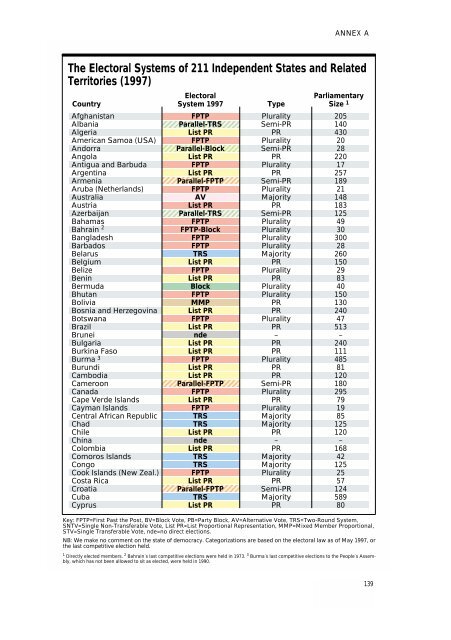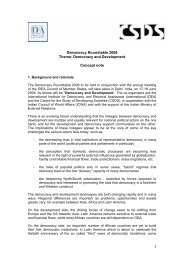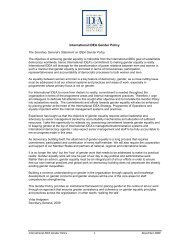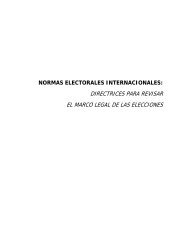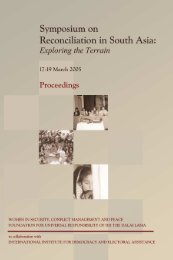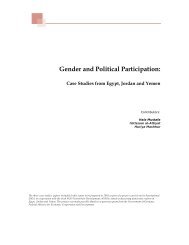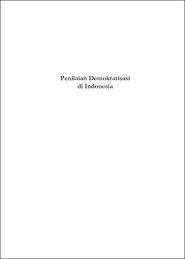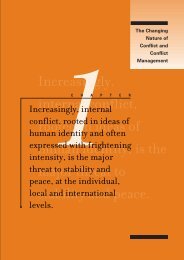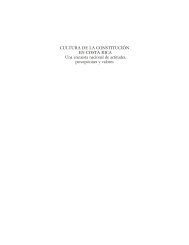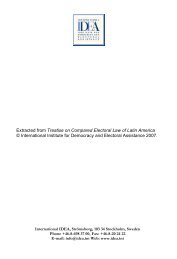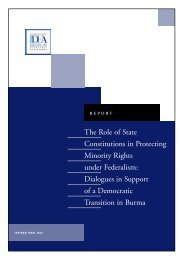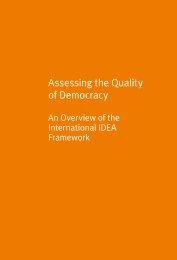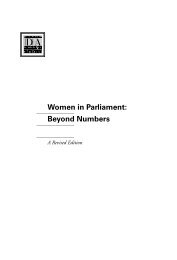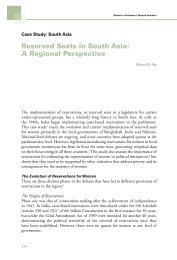The Electoral Systems of 211 Independent ... - International IDEA
The Electoral Systems of 211 Independent ... - International IDEA
The Electoral Systems of 211 Independent ... - International IDEA
Create successful ePaper yourself
Turn your PDF publications into a flip-book with our unique Google optimized e-Paper software.
ANNEX A<br />
<strong>The</strong> <strong>Electoral</strong> <strong>Systems</strong> <strong>of</strong> <strong>211</strong> <strong>Independent</strong> States and Related<br />
Territories (1997)<br />
Country<br />
Afghanistan<br />
Albania<br />
Algeria<br />
American Samoa (USA)<br />
Andorra<br />
Angola<br />
Antigua and Barbuda<br />
Argentina<br />
Armenia<br />
Aruba (Netherlands)<br />
Australia<br />
Austria<br />
Azerbaijan<br />
Bahamas<br />
Bahrain 2<br />
Bangladesh<br />
Barbados<br />
Belarus<br />
Belgium<br />
Belize<br />
Benin<br />
Bermuda<br />
Bhutan<br />
Bolivia<br />
Bosnia and Herzegovina<br />
Botswana<br />
Brazil<br />
Brunei<br />
Bulgaria<br />
Burkina Faso<br />
Burma 3<br />
Burundi<br />
Cambodia<br />
Cameroon<br />
Canada<br />
Cape Verde Islands<br />
Cayman Islands<br />
Central African Republic<br />
Chad<br />
Chile<br />
China<br />
Colombia<br />
Comoros Islands<br />
Congo<br />
Cook Islands (New Zeal.)<br />
Costa Rica<br />
Croatia<br />
Cuba<br />
Cyprus<br />
<strong>Electoral</strong><br />
System 1997<br />
FPTP<br />
Parallel-TRS<br />
List PR<br />
;;;;<br />
FPTP<br />
Parallel-Block<br />
;;;;<br />
List PR<br />
FPTP<br />
List PR<br />
;;;;<br />
Parallel-FPTP<br />
FPTP<br />
AV<br />
;;;;<br />
List PR<br />
Parallel-TRS<br />
FPTP<br />
FPTP-Block<br />
FPTP<br />
FPTP<br />
TRS<br />
List PR<br />
FPTP<br />
List PR<br />
Block<br />
FPTP<br />
MMP<br />
List PR<br />
FPTP<br />
List PR<br />
nde<br />
List PR<br />
List PR<br />
FPTP<br />
List PR<br />
List PR<br />
;;;;<br />
Parallel-FPTP<br />
FPTP<br />
List PR<br />
FPTP<br />
TRS<br />
TRS<br />
List PR<br />
nde<br />
List PR<br />
TRS<br />
TRS<br />
FPTP<br />
List PR<br />
Parallel-FPTP<br />
TRS<br />
;;;;<br />
List PR<br />
Type<br />
Plurality<br />
Semi-PR<br />
PR<br />
Plurality<br />
Semi-PR<br />
PR<br />
Plurality<br />
PR<br />
Semi-PR<br />
Plurality<br />
Majority<br />
PR<br />
Semi-PR<br />
Plurality<br />
Plurality<br />
Plurality<br />
Plurality<br />
Majority<br />
PR<br />
Plurality<br />
PR<br />
Plurality<br />
Plurality<br />
PR<br />
PR<br />
Plurality<br />
PR<br />
–<br />
PR<br />
PR<br />
Plurality<br />
PR<br />
PR<br />
Semi-PR<br />
Plurality<br />
PR<br />
Plurality<br />
Majority<br />
Majority<br />
PR<br />
–<br />
PR<br />
Majority<br />
Majority<br />
Plurality<br />
PR<br />
Semi-PR<br />
Majority<br />
PR<br />
Parliamentary<br />
Size 1<br />
205<br />
140<br />
430<br />
20<br />
28<br />
220<br />
17<br />
257<br />
189<br />
21<br />
148<br />
183<br />
125<br />
49<br />
30<br />
300<br />
28<br />
260<br />
150<br />
29<br />
83<br />
40<br />
150<br />
130<br />
240<br />
47<br />
513<br />
–<br />
240<br />
111<br />
485<br />
81<br />
120<br />
180<br />
295<br />
79<br />
19<br />
85<br />
125<br />
120<br />
–<br />
168<br />
42<br />
125<br />
25<br />
57<br />
124<br />
589<br />
80<br />
Key: FPTP=First Past the Post, BV=Block Vote, PB=Party Block, AV=Alternative Vote, TRS=Two-Round System,<br />
SNTV=Single Non-Transferable Vote, List PR=List Proportional Representation, MMP=Mixed Member Proportional,<br />
STV=Single Transferable Vote, nde=no direct elections.<br />
NB: We make no comment on the state <strong>of</strong> democracy. Categorizations are based on the electoral law as <strong>of</strong> May 1997, or<br />
the last competitive election held.<br />
1 Directly elected members. 2 Bahrain´s last competitive elections were held in 1973. 3 Burma´s last competitive elections to the People´s Assembly,<br />
which has not been allowed to sit as elected, were held in 1990.<br />
139
Country<br />
Czech Republic<br />
Denmark<br />
Djibouti<br />
Dominica<br />
Dominican Republic<br />
Ecuador<br />
Egypt<br />
El Salvador<br />
Equatorial Guinea<br />
Eritrea<br />
Estonia<br />
Ethiopia<br />
Fed. St. <strong>of</strong> Micronesia<br />
Fiji<br />
Finland<br />
France<br />
French Guiana (France)<br />
French Polynesia (Fra.)<br />
Gabon<br />
Gambia<br />
Georgia<br />
Germany<br />
Ghana<br />
Greece<br />
Grenada<br />
Guadeloupe (France)<br />
Guam (USA)<br />
Guatemala<br />
Guernsey (UK)<br />
Guinea<br />
Guinea-Bissau<br />
Guyana<br />
Haiti<br />
Honduras<br />
Hungary<br />
Iceland<br />
India<br />
Indonesia<br />
Iran<br />
Iraq<br />
Ireland<br />
Isle <strong>of</strong> Man (UK)<br />
Israel<br />
Italy<br />
Ivory Coast<br />
Jamaica<br />
Japan<br />
Jersey (UK)<br />
Jordan<br />
Kazakhstan<br />
Kenya<br />
Kiribati<br />
Korea (North)<br />
Korea (South)<br />
Kuwait<br />
Kyrgyzstan<br />
<strong>Electoral</strong><br />
System 1997<br />
List PR<br />
List PR<br />
PB<br />
FPTP<br />
List PR<br />
Parallel-PB<br />
TRS<br />
;;;;;<br />
List PR<br />
List PR<br />
List PR<br />
List PR<br />
FPTP<br />
FPTP<br />
Block-FPTP<br />
List PR<br />
TRS<br />
TRS<br />
List PR<br />
TRS<br />
FPTP<br />
Parallel-TRS<br />
MMP<br />
;;;;;<br />
FPTP<br />
List PR<br />
FPTP<br />
TRS<br />
FPTP<br />
Parallel-FPTP<br />
;;;;;<br />
FPTP<br />
Parallel-FPTP<br />
;;;;;<br />
List PR<br />
List PR<br />
TRS<br />
List PR<br />
MMP<br />
List PR<br />
FPTP<br />
List PR<br />
TRS<br />
TRS<br />
STV<br />
FPTP<br />
List PR<br />
MMP<br />
FPTP-Block<br />
FPTP<br />
;;;;;<br />
Parallel-FPTP<br />
FPTP<br />
SNTV<br />
FPTP<br />
FPTP<br />
TRS<br />
;;;;;<br />
FPTP<br />
Parallel-FPTP<br />
Block<br />
;;;;;<br />
TRS<br />
Type<br />
PR<br />
PR<br />
Plurality<br />
Plurality<br />
PR<br />
Semi-PR<br />
Majority<br />
PR<br />
PR<br />
PR<br />
PR<br />
Plurality<br />
Plurality<br />
Plurality<br />
PR<br />
Majority<br />
Majority<br />
PR<br />
Majority<br />
Plurality<br />
Semi-PR<br />
PR<br />
Plurality<br />
PR<br />
Plurality<br />
Majority<br />
Plurality<br />
Semi-PR<br />
Plurality<br />
Semi-PR<br />
PR<br />
PR<br />
Majority<br />
PR<br />
PR<br />
PR<br />
Plurality<br />
PR<br />
Majority<br />
Majority<br />
PR<br />
Plurality<br />
PR<br />
PR<br />
Plurality<br />
Plurality<br />
Semi-PR<br />
Plurality<br />
Semi-PR<br />
Plurality<br />
Plurality<br />
Majority<br />
Plurality<br />
Semi-PR<br />
Plurality<br />
Majority<br />
Parliamentary<br />
Size<br />
200<br />
179<br />
65<br />
31<br />
120<br />
77<br />
444<br />
84<br />
80<br />
130<br />
101<br />
547<br />
14<br />
70<br />
200<br />
577<br />
19<br />
41<br />
120<br />
36<br />
235<br />
656<br />
200<br />
300<br />
15<br />
42<br />
21<br />
80<br />
33<br />
114<br />
100<br />
53<br />
83<br />
128<br />
386<br />
63<br />
543<br />
425<br />
270<br />
250<br />
166<br />
24<br />
120<br />
630<br />
175<br />
60<br />
500<br />
53<br />
80<br />
67<br />
188<br />
39<br />
687<br />
299<br />
50<br />
35<br />
Key: FPTP=First Past the Post, BV=Block Vote, PB=Party Block, AV=Alternative Vote, TRS=Two-Round System,<br />
SNTV=Single Non-Transferable Vote, List PR=List Proportional Representation, MMP=Mixed Member Proportional,<br />
STV=Single Transferable Vote, nde=no direct elections.<br />
140
Country<br />
Laos<br />
Latvia<br />
Lebanon<br />
Lesotho<br />
Liberia<br />
Libya<br />
Liechtenstein<br />
Lithuania<br />
Luxembourg<br />
Macedonia<br />
Madagascar<br />
Malawi<br />
Malaysia<br />
Maldives<br />
Mali<br />
Malta<br />
Marshall Islands<br />
Martinique (France)<br />
Mauritania<br />
Mauritius<br />
Mayotte (France)<br />
Mexico<br />
Moldova<br />
Monaco<br />
Mongolia<br />
Montserrat<br />
Morocco<br />
Mozambique<br />
Namibia<br />
Nauru<br />
Nepal<br />
Netherlands<br />
Neth. Antilles (Neth.)<br />
New Caledonia (France)<br />
New Zealand<br />
Nicaragua<br />
Niger<br />
Nigeria<br />
Niue (New Zealand)<br />
North Mariana Isl. (USA)<br />
Norway<br />
Oman<br />
Pakistan<br />
Palau<br />
Palestinian Authority<br />
Panama<br />
Papua New Guinea<br />
Paraguay<br />
Peru<br />
Philippines<br />
Poland<br />
Portugal<br />
Puerto Rico (USA)<br />
Qatar<br />
Réunion (France)<br />
Romania<br />
Russia<br />
<strong>Electoral</strong><br />
System 1997<br />
Block<br />
List PR<br />
PB<br />
FPTP<br />
List PR<br />
nde<br />
List PR<br />
;;;;;<br />
Parallel-TRS<br />
List PR<br />
TRS<br />
List PR<br />
FPTP<br />
FPTP<br />
Block<br />
TRS<br />
STV<br />
FPTP<br />
TRS<br />
TRS<br />
Block<br />
TRS-FPTP<br />
MMP<br />
TRS<br />
TRS<br />
FPTP<br />
FPTP<br />
FPTP<br />
List PR<br />
List PR<br />
AV<br />
FPTP<br />
List PR<br />
List PR<br />
List PR<br />
MMP<br />
List PR<br />
Parallel-FPTP<br />
FPTP<br />
;;;;;<br />
FPTP-Block<br />
FPTP<br />
List PR<br />
nde<br />
FPTP<br />
FPTP<br />
Block<br />
List PR<br />
FPTP<br />
List PR<br />
List PR<br />
Block<br />
List PR<br />
List PR<br />
FPTP<br />
nde<br />
TRS<br />
List PR<br />
;;;;;<br />
Parallel-FPTP<br />
;;;;;<br />
Type<br />
Plurality<br />
PR<br />
Plurality<br />
Plurality<br />
PR<br />
–<br />
PR<br />
Semi-PR<br />
PR<br />
Majority<br />
PR<br />
Plurality<br />
Plurality<br />
Plurality<br />
Majority<br />
PR<br />
Plurality<br />
Majority<br />
Majority<br />
Plurality<br />
Majority<br />
PR<br />
Majority<br />
Majority<br />
Plurality<br />
Plurality<br />
Plurality<br />
PR<br />
PR<br />
Majority<br />
Plurality<br />
PR<br />
PR<br />
PR<br />
PR<br />
PR<br />
Semi-PR<br />
Plurality<br />
Plurality<br />
Plurality<br />
PR<br />
–<br />
Plurality<br />
Plurality<br />
Plurality<br />
PR<br />
Plurality<br />
PR<br />
PR<br />
Plurality<br />
PR<br />
PR<br />
Plurality<br />
–<br />
Majority<br />
PR<br />
Semi-PR<br />
Parliamentary<br />
Size<br />
85<br />
100<br />
128<br />
65<br />
64<br />
–<br />
25<br />
141<br />
60<br />
120<br />
138<br />
177<br />
192<br />
40<br />
147<br />
65<br />
33<br />
45<br />
79<br />
70<br />
17<br />
500<br />
104<br />
18<br />
76<br />
7<br />
222<br />
250<br />
72<br />
18<br />
205<br />
150<br />
27<br />
54<br />
120<br />
92<br />
83<br />
593<br />
20<br />
18<br />
165<br />
–<br />
217<br />
30<br />
88<br />
72<br />
109<br />
80<br />
120<br />
204<br />
460<br />
230<br />
53<br />
–<br />
44<br />
328<br />
450<br />
Key: FPTP=First Past the Post, BV=Block Vote, PB=Party Block, AV=Alternative Vote, TRS=Two-Round System,<br />
SNTV=Single Non-Transferable Vote, List PR=List Proportional Representation, MMP=Mixed Member Proportional,<br />
STV=Single Transferable Vote, nde=no direct elections.<br />
141
Country<br />
Rwanda<br />
San Marino<br />
Sao Tomé and Principe<br />
Saudi Arabia<br />
Senegal<br />
Seychelles<br />
Sierra Leone<br />
Singapore<br />
Slovakia<br />
Slovenia<br />
Solomon Islands<br />
Somalia 4<br />
South Africa<br />
Spain<br />
Sri Lanka<br />
St. Kitts and Nevis<br />
St. Lucia<br />
St. Pierre & Miquelon (Fra.)<br />
St. Vincent & the Grenadines<br />
Sudan<br />
Suriname<br />
Swaziland<br />
Sweden<br />
Switzerland<br />
Syria<br />
Taiwan<br />
Tajikistan<br />
Tanzania<br />
Thailand<br />
Togo<br />
Tonga<br />
Trinidad and Tobago<br />
Tunisia<br />
Turkey<br />
Turkmenistan<br />
Turks and Caicos Islands<br />
Tuvalu<br />
Uganda<br />
Ukraine<br />
United Arab Emirates<br />
United Kingdom<br />
United States <strong>of</strong> America<br />
Uruguay<br />
Uzbekistan<br />
Vanuatu<br />
Venezuela<br />
Vietnam<br />
Virgin Islands (UK)<br />
Virgin Islands (USA)<br />
Wallis and Futuna (Fra.)<br />
Western Samoa<br />
Yemen<br />
Yugoslavia<br />
Zaire/Dem. Rep. <strong>of</strong> the Congo<br />
Zambia<br />
Zimbabwe<br />
<strong>Electoral</strong><br />
System 1997<br />
FPTP<br />
List PR<br />
List PR<br />
nde<br />
;;;;;<br />
Parallel-PB<br />
Parallel-FPTP<br />
;;;;;<br />
List PR<br />
PB-FPTP<br />
List PR<br />
List PR<br />
FPTP<br />
Parallel-FPTP<br />
List PR<br />
;;;;;<br />
List PR<br />
List PR<br />
FPTP<br />
FPTP<br />
TRS-FPTP<br />
FPTP<br />
FPTP<br />
List PR<br />
FPTP<br />
List PR<br />
List PR<br />
FPTP<br />
;;;;;<br />
Parallel-SNTV<br />
TRS<br />
FPTP<br />
Block<br />
TRS<br />
FPTP<br />
FPTP<br />
;;;;;<br />
Parallel-PB<br />
List PR<br />
;;;;;<br />
TRS<br />
FPTP<br />
FPTP<br />
FPTP<br />
TRS<br />
nde<br />
FPTP<br />
FPTP<br />
List PR<br />
TRS<br />
SNTV<br />
MMP<br />
TRS<br />
FPTP<br />
Block<br />
List PR<br />
FPTP-Block<br />
FPTP<br />
List PR<br />
FPTP<br />
FPTP<br />
FPTP<br />
Type<br />
Plurality<br />
PR<br />
PR<br />
–<br />
Semi-PR<br />
Semi-PR<br />
PR<br />
Plurality<br />
PR<br />
PR<br />
Plurality<br />
Semi-PR<br />
PR<br />
PR<br />
PR<br />
Plurality<br />
Plurality<br />
Majority<br />
Plurality<br />
Plurality<br />
PR<br />
Plurality<br />
PR<br />
PR<br />
Plurality<br />
Semi-PR<br />
Majority<br />
Plurality<br />
Plurality<br />
Majority<br />
Plurality<br />
Plurality<br />
Semi-PR<br />
PR<br />
Majority<br />
Plurality<br />
Plurality<br />
Plurality<br />
Majority<br />
–<br />
Plurality<br />
Plurality<br />
PR<br />
Majority<br />
Semi-PR<br />
PR<br />
Majority<br />
Plurality<br />
Plurality<br />
PR<br />
Plurality<br />
Plurality<br />
PR<br />
Plurality<br />
Plurality<br />
Plurality<br />
Parliamentary<br />
Size<br />
70<br />
60<br />
55<br />
–<br />
120<br />
33<br />
68<br />
83<br />
150<br />
90<br />
47<br />
123<br />
400<br />
350<br />
225<br />
11<br />
17<br />
19<br />
15<br />
275<br />
51<br />
55<br />
349<br />
200<br />
250<br />
164<br />
181<br />
232<br />
391<br />
81<br />
9<br />
36<br />
163<br />
550<br />
50<br />
13<br />
12<br />
214<br />
450<br />
–<br />
659<br />
435<br />
99<br />
250<br />
50<br />
203<br />
393<br />
9<br />
15<br />
20<br />
47<br />
301<br />
138<br />
210<br />
150<br />
120<br />
Key: FPTP=First Past the Post, BV=Block Vote, PB=Party Block, AV=Alternative Vote, TRS=Two-Round System,<br />
SNTV=Single Non-Transferable Vote, List PR=List Proportional Representation, MMP=Mixed Member Proportional,<br />
STV=Single Transferable Vote, nde=no direct elections.<br />
4 Data based on Somalia´s last competitive elections, held in 1969<br />
142
143
144
Glossary <strong>of</strong> Terms<br />
ANNEX B<br />
Additional Member System – Another term for a Mixed Member Proportional system.<br />
Alternative Vote (AV) – A preferential, plurality-majority system used in single-member<br />
districts in which voters use numbers to mark their preferences on the ballot paper.<br />
A candidate who receives over 50% <strong>of</strong> first-preferences is declared elected. If no<br />
candidate achieves an absolute majority <strong>of</strong> first-preferences, votes are re-allocated<br />
until one candidate has an absolute majority <strong>of</strong> votes cast.<br />
Apparentement – A device used in some List Proportional Representation systems which<br />
enables separate parties to declare themselves linked for the purpose <strong>of</strong> seat allocation.<br />
Ballot structure – <strong>The</strong> way in which electoral choices are presented on the ballot<br />
paper. Ballots can be either ordinal or categorical.<br />
Bi-cameral Parliament – A legislature comprised <strong>of</strong> two houses, usually known as an<br />
upper house and a lower house.<br />
Block Vote (BV) – A plurality-majority system used in multi-member districts in which<br />
electors have as many votes as there are candidates to be elected. Voting can be<br />
either candidate-centred or party-centred. Counting is identical to a First Past the Post<br />
system, with the candidates with the highest vote totals winning the seats.<br />
Candidate-centred Ballot – A form <strong>of</strong> ballot in which an elector chooses between candidates.<br />
Categorical Ballot – A form <strong>of</strong> ballot in which only a single choice for a candidate or<br />
party can be made.<br />
Closed List – A form <strong>of</strong> List Proportional Representation in which electors are restricted<br />
to voting for a party only, and cannot express a preference for any candidate within<br />
a party list.<br />
Communal Roll – A register <strong>of</strong> voters in which ascriptive criteria such as race or<br />
ethnicity determine which electors can enrol to vote, and which candidates can be<br />
elected, within the wider electoral contest.<br />
Compensatory Seats – <strong>The</strong> List PR seats in a Mixed Member Proportional system which<br />
are awarded to parties on the basis <strong>of</strong> their proportion <strong>of</strong> the national vote and<br />
designed to correct any disproportionality in the results <strong>of</strong> the elections held in<br />
plurality-majority district seats.<br />
Constituency – A synonym for district, used predominantly in Anglophone countries<br />
outside <strong>of</strong> the United States.<br />
Contiguous districts – Districts comprised <strong>of</strong> areas which are geographically adjoined or<br />
touching.<br />
Cross Cutting Cleavages – Political allegiances <strong>of</strong> voters which cut across societal cleavages<br />
<strong>of</strong> ethnicity, religion, or class.<br />
Cumulation – <strong>The</strong> capacity within some systems <strong>of</strong> List Proportional Representation to<br />
cast more than one vote for a favoured candidate.<br />
145
d’Hondt Formula – One way <strong>of</strong> working out List PR results by the highest average<br />
method. Uses divisors <strong>of</strong> 1,2,3,4, etc.<br />
Democratic Consolidation – <strong>The</strong> process by which a nation’s political institutions and<br />
democratic procedures become legitimized and broadly accepted by both political<br />
actors and the wider population.<br />
Distribution Requirements – <strong>The</strong> requirement that to win election a candidate must<br />
not merely win a specified proportion <strong>of</strong> the vote nationally but also a specified<br />
degree <strong>of</strong> support from different regions.<br />
District – Geographic areas into which a country is divided for electoral purposes.<br />
Districts may return one member to parliament, or more than one.<br />
District Magnitude – <strong>The</strong> number <strong>of</strong> members to be elected in each district.<br />
Droop Quota – Used in highest average List PR and STV electoral systems to determine<br />
how seats are awarded. <strong>The</strong> quota is ascertained by the following formula: total<br />
vote divided by the number <strong>of</strong> seats plus one, then one is added to the product.<br />
<strong>Electoral</strong> Formula – That part <strong>of</strong> the electoral system dealing specifically with the<br />
translation <strong>of</strong> votes into seats.<br />
<strong>Electoral</strong> Law – <strong>The</strong> constitutional and legal provisions governing all aspects <strong>of</strong> the<br />
electoral process.<br />
<strong>Electoral</strong> System – That part <strong>of</strong> the electoral rules which determines electoral outcomes;<br />
chiefly, the electoral formula, the ballot structure, and district magnitude.<br />
First Past the Post (FPTP) – <strong>The</strong> simplest form <strong>of</strong> plurality-majority electoral system, using<br />
single-member districts, a categorical ballot and candidate-centred voting. <strong>The</strong> winning<br />
candidate is the one who gains more votes than any other candidate, but not<br />
necessarily a majority <strong>of</strong> votes.<br />
Free List – A form <strong>of</strong> List Proportional Representation which provides for apparentement or<br />
cumulation.<br />
Gerrymandering – <strong>The</strong> deliberate manipulation <strong>of</strong> district boundaries so as to advantage<br />
or disadvantage a particular interest.<br />
Hagenbach-Bisch<strong>of</strong>f Formula – Another term for the Droop Quota.<br />
Hare Quota – Used in largest remainder PR electoral systems to determine how seats are<br />
awarded. <strong>The</strong> quota is ascertained by the following formula: total vote divided by<br />
the number <strong>of</strong> seats.<br />
Heterogeneous – Diverse and/or inter-mixed.<br />
Highest Average Method – A formula used with List PR systems to translate votes into<br />
seats. Party vote totals are divided by a series <strong>of</strong> devisors, under d’Hondt (by 1,2,3,<br />
etc.) or Sainte-Laguë (by 1,3,5, etc.) formulae. After each stage the party with the<br />
highest average wins the seat. <strong>The</strong> count continues with party vote totals being<br />
divided by sequential numbers until all seats are filled.<br />
Homogeneous – Similar and/or uniform.<br />
Imperiali Quota – Sometimes used in largest remainder PR electoral systems to determine<br />
how seats are awarded. <strong>The</strong> quota is ascertained by the following formula: total<br />
vote divided by the number <strong>of</strong> seats plus two.<br />
Index <strong>of</strong> Disproportionality – A figure which illustrates the collective disparity between<br />
the votes cast for parties in an election and the seats in parliament they win.<br />
146
Invalid Votes – Ballots which, due to accidental or deliberate errors <strong>of</strong> marking on the<br />
part <strong>of</strong> voters, are unable to be included in the count.<br />
Largest Remainder Method – <strong>The</strong> Hare, Droop and Imperiali calculation methods which<br />
translate votes into seats within List PR systems. <strong>The</strong>re are two stages to the count.<br />
First, parties are awarded seats in proportion to the number <strong>of</strong> quotas they fulfil<br />
(quotas vary depending on which <strong>of</strong> the three systems are used). Second, remaining<br />
seats are awarded to parties on the basis <strong>of</strong> the left over votes they posess<br />
after the “quota” stage <strong>of</strong> the count. Largest remainder seats are allocated in order<br />
<strong>of</strong> vote size.<br />
Lemas – A form <strong>of</strong> apparentement used predominantly in Latin America.<br />
Limited Vote – A plurality-majority system used in multi-member districts in which electors<br />
have more than one vote but fewer votes than there are candidates to be elected.<br />
Counting is identical to a First Past the Post system, with the candidates with the<br />
highest vote totals winning the seats.<br />
List Proportional Representation (List PR) – In its most simple form List PR involves<br />
each party presenting a list <strong>of</strong> candidates to the electorate, voters vote for a party,<br />
and parties receive seats in proportion to their overall share <strong>of</strong> the national vote.<br />
Winning candidates are taken from the lists.<br />
Lower House – <strong>The</strong> first, and usually most important, chamber in a bi-cameral parliament.<br />
Malapportionment – <strong>The</strong> uneven distribution <strong>of</strong> voters between electoral districts.<br />
Majority-Plurality (Two-Round System) – In French Two-Round elections any candidate<br />
who has received the votes <strong>of</strong> over 12.5 per cent <strong>of</strong> the registered electorate in the<br />
first round can stand in the second round. Whoever wins the highest numbers <strong>of</strong><br />
votes in the second round is then declared elected, regardless <strong>of</strong> whether they have<br />
won an absolute majority or not. We therefore refer to it as majority-plurality<br />
variant <strong>of</strong> the Two-Round System.<br />
Majority-Run<strong>of</strong>f (Two-Round System) – <strong>The</strong> most common method for the second round<br />
<strong>of</strong> voting in a Two-Round System is a straight “run-<strong>of</strong>f” contest between the two<br />
highest vote-winners from the first round – this we term a majority-run<strong>of</strong>f system.<br />
Manufactured Majority – Where a single party wins less than 50 per cent <strong>of</strong> the valid<br />
votes, but an absolute majority <strong>of</strong> the parliamentary seats.<br />
Mixed Member Proportional (MMP) – <strong>Systems</strong> in which a proportion <strong>of</strong> the parliament<br />
(usually half) is elected from plurality-majority districts, while the remaining members<br />
are chosen from PR lists. Under MMP the list PR seats compensate for any<br />
disproportionality produced by the district seat results.<br />
Multi-Member District – A district from which more than one member is elected to<br />
parliament.<br />
Open List – A form <strong>of</strong> List Proportional Representation in which electors can express a<br />
preference for a candidate within a party list, as well as voting for the party.<br />
Ordinal Ballot – A form <strong>of</strong> ballot in which a voter’s choice can be rank-ordered (as for<br />
preferential systems), changed between one round <strong>of</strong> voting and the next (as for Two-<br />
Round <strong>Systems</strong>) or split between two or more parties or candidates (as for Block and<br />
panachage list PR systems).<br />
147
Panachage – A device used in some List Proportional Representation systems which<br />
enables an elector to vote for more than one candidate across different party lists.<br />
Parallel System – A semi-proportional system in which proportional representation is used in<br />
conjunction with a plurality-majority system but where, unlike MMP, the PR seats<br />
do not compensate for any disproportionality arising from elections to the pluralitymajority<br />
seats.<br />
Party Block Vote (PB) – A form <strong>of</strong> the Block Vote in which electors choose between<br />
parties rather than candidates. <strong>The</strong> successful party will typically win every seat in<br />
the district.<br />
Party-centred Ballot – A form <strong>of</strong> ballot in which an elector chooses between parties.<br />
Plurality-Majority <strong>Systems</strong> – <strong>The</strong> distinguishing feature <strong>of</strong> plurality-majority systems is<br />
that they almost always use single-member districts. In a First Past the Post system, the<br />
winner is the candidate with a plurality <strong>of</strong> votes, but not necessarily an absolute<br />
majority <strong>of</strong> the votes. When this system is used in multi-member districts it becomes<br />
the Block Vote. Majority systems, such as the Australian Alternative Vote and the<br />
French Two-Round System, try to ensure that the winning candidate receives an<br />
absolute majority <strong>of</strong> votes cast.<br />
Preferential Voting – <strong>Electoral</strong> systems in which voters can rank-order candidates on the<br />
ballot paper in order <strong>of</strong> their choice. <strong>The</strong> Alternative Vote, the Single Transferable<br />
Vote and the system used to elect the Sri Lankan president are all examples <strong>of</strong> preferential<br />
voting.<br />
Proportional Representation (PR) – Any system which consciously attempts to reduce<br />
the disparity between a party’s share <strong>of</strong> the national vote and its share <strong>of</strong> the parliamentary<br />
seats. For example, if a party wins 40 per cent <strong>of</strong> the votes, it should<br />
win approximately 40 per cent <strong>of</strong> the seats.<br />
Quota – <strong>The</strong> threshold for winning a seat in proportional representation systems.<br />
Regional Fiefdom – A situation in which one party wins all, or nearly all, <strong>of</strong> the seats<br />
in a particular geographic region.<br />
Reserved Seats – Seats in which some ascriptive criteria such as religion, ethnicity,<br />
language, gender etc. is a requirement for election.<br />
Sainte-Laguë Formula – One way <strong>of</strong> working out List PR results by the highest average<br />
method. Uses divisors <strong>of</strong> 1,3,5,7, etc.<br />
Semi-Proportional <strong>Systems</strong> (Semi-PR) – Those electoral systems which provide, on average,<br />
results which fall some way in between the proportionality <strong>of</strong> PR systems and<br />
the disproportionality <strong>of</strong> plurality-majority systems.<br />
Single-Member District – A district from which only one member is elected to parliament.<br />
Single Non-Transferable Vote (SNTV) – A semi-proportional system which combines multimember<br />
districts with a First Past the Post method <strong>of</strong> vote counting, and in which<br />
electors have only one vote.<br />
Single Transferable Vote (STV) – A preferential proportional representation system used in<br />
multi-member districts. To gain election, candidates must surpass a specified quota <strong>of</strong><br />
first-preference votes. Voters’ preferences are re-allocated to other continuing candidates<br />
when an unsuccessful candidate is excluded or if an elected candidate has a<br />
surplus.<br />
148
Threshold – <strong>The</strong> minimum level <strong>of</strong> support which a party needs to gain representation;<br />
usually expressed as a percentage <strong>of</strong> the total vote.<br />
Two-Tier Districting – Where seats are awarded to parties from both single member<br />
districts and national PR lists, or both regional and national PR lists.<br />
Two-Round System (TRS) – A plurality-majority system in which a second election is<br />
held if no candidate achieves an absolute majority <strong>of</strong> votes in the first election.<br />
Upper House – <strong>The</strong> second, and usually less important, chamber <strong>of</strong> a bi-cameral parliament.<br />
Wasted Votes – Those votes which did not ultimately count towards the election <strong>of</strong> a<br />
particular candidate or party.<br />
149
150
Further Reading<br />
ANNEX C<br />
Amy, Douglas. 1993. Real Choices: New Voices: <strong>The</strong> Case for PR Elections in the United<br />
States. New York, Columbia University Press.<br />
Asmal, Kader. 1990. <strong>Electoral</strong> <strong>Systems</strong>: A Critical Survey. Bellville: Centre for<br />
Development Studies, University <strong>of</strong> the Western Cape.<br />
Barkan, Joel D. 1995. “Elections in Agrarian Societies”, Journal <strong>of</strong> Democracy 6: 106-116.<br />
Bogdanor, Vernon and David Butler. eds. 1983. Democracy and Elections. Cambridge:<br />
Cambridge University Press.<br />
Bogdanor, Vernon. 1984. What is Proportional Representation? Oxford: Martin Robertson.<br />
Boston, Jonathan, Stephen Levine, Elizabeth McLeay, and Nigel S. Roberts. 1996.<br />
New Zealand Under MMP: A New Politics? Auckland: Auckland University Press.<br />
Butler, David, Howard Penniman and Austin Ranney. 1981. Democracy at the Polls: A<br />
Comparative Study <strong>of</strong> Competitive National Elections. Washington DC: American Enterprise<br />
Institute.<br />
Catt, Helena, Paul Harris and Nigel S. Roberts. 1992. Voter’s Choice: <strong>Electoral</strong> Change<br />
in New Zealand? Palmerston North: Dunmore Press.<br />
Downs, Anthony. 1957. An Economic <strong>The</strong>ory <strong>of</strong> Democracy. New York: Harper and Row.<br />
Elklit, Jørgen and Nigel Roberts. 1996. “A Category <strong>of</strong> its Own? Four PR Two-<br />
Tier Compensatory Member <strong>Electoral</strong> <strong>Systems</strong> in 1994”, European Journal <strong>of</strong> Political<br />
Research 30: 217-240.<br />
Elklit, Jørgen. 1993. “Simpler than its Reputation: <strong>The</strong> <strong>Electoral</strong> System in Denmark<br />
since 1920”, <strong>Electoral</strong> Studies 12: 41-57.<br />
Farrell, David M. 1997. Comparing <strong>Electoral</strong> <strong>Systems</strong>. London: Prentice Hall/Harvester<br />
Wheatsheaf.<br />
Finer, S. E. ed. 1975. Adversary Politics and <strong>Electoral</strong> Reform. London: Anthony Wigram.<br />
Gallagher, Michael. 1992. “Comparing Proportional Representation <strong>Electoral</strong><br />
<strong>Systems</strong>: Quotas, Thresholds, Paradoxes, and Majorities”, British Journal <strong>of</strong> Political<br />
Science 22: 469-496.<br />
Gr<strong>of</strong>man, Bernard and Arend Lijphart. eds. 1986. <strong>Electoral</strong> Laws and their Political<br />
Consequences. New York: Agathon Press.<br />
151
Gr<strong>of</strong>man, Bernard and Chandler Davidson. eds. 1992. Controversies in Minority Voting.<br />
Washington DC: Brookings.<br />
Gr<strong>of</strong>man, Bernard, Arend Lijphart, Robert McKay and Howard Scarrow. eds.<br />
1982. Representation and Redistricting Issues. Lexington: Lexington Books.<br />
Guinier, Lani. 1994. <strong>The</strong> Tyranny <strong>of</strong> the Majority. New York: Free Press.<br />
Hermens, Ferdinand. 1972. Democracy or Anarchy? A Study <strong>of</strong> Proportional Representation,<br />
2nd ed. New York: Johnson Reprint Corporation.<br />
Horowitz, Donald L. 1991. A Democratic South Africa?: Constitutional Engineering in a<br />
Divided Society. Berkeley: University <strong>of</strong> California Press.<br />
Horowitz, Donald L. 1993. “Democracy in Divided Societies”, Journal <strong>of</strong> Democracy<br />
4: 18-38.<br />
Inter-Parliamentary Union. 1993. <strong>Electoral</strong> <strong>Systems</strong>: A World-wide Comparative Study.<br />
Geneva: Inter-Parliamentary Union.<br />
Jones, Mark P. 1995. <strong>Electoral</strong> Laws and the Survival <strong>of</strong> Presidential Democracies. Notre<br />
Dame: University <strong>of</strong> Notre Dame Press.<br />
Kotzë, Hennie. 1992. President’s Council Report on a Proportional Polling System for South<br />
Africa in a New Constitutional Dispensation. Pretoria: Government Printer.<br />
Lakeman, Enid. 1974. How Democracies Vote. London: Faber and Faber.<br />
Lardeyret, Guy. 1991. “<strong>The</strong> Problem with PR”, Journal <strong>of</strong> Democracy 2: 30-35.<br />
LeDuc, Lawrence, Richard G. Niemi and Pippa Norris. eds. 1996. Comparing<br />
Democracies: Elections and Voting in Global Perspective. Thousand Oaks: Sage.<br />
Lijphart, Arend, and Bernard Gr<strong>of</strong>man, eds. 1984. Choosing an <strong>Electoral</strong> System: Issues<br />
and Alternatives. New York: Praeger.<br />
Lijphart, Arend. 1984. Democracies. New Haven: Yale University Press.<br />
Lijphart, Arend. 1990. “<strong>Electoral</strong> <strong>Systems</strong>, Party <strong>Systems</strong>, and Conflict Management<br />
in Segmented Societies”, pp. 2-13. In Robert A. Schrire, ed. Critical Choices for South<br />
Africa. Cape Town: Oxford University Press.<br />
Lijphart, Arend. 1991a. “Constitutional Choices for New Democracies”, Journal <strong>of</strong><br />
Democracy 2: 72-84.<br />
Lijphart, Arend. 1991b. “Proportional Representation: Double Checking the<br />
Evidence”, Journal <strong>of</strong> Democracy 2: 42-48.<br />
Lijphart, Arend. 1994. <strong>Electoral</strong> <strong>Systems</strong> and Party <strong>Systems</strong>: A Study <strong>of</strong> Twenty-Seven<br />
Democracies, 1945-1990. New York: Oxford University Press.<br />
152
Lijphart, Arend. 1995a. “<strong>Electoral</strong> <strong>Systems</strong>”, pp. 412-422. In Lipset. ed. <strong>The</strong><br />
Encyclopedia <strong>of</strong> Democracy. Washington DC: Congressional Quarterly Press.<br />
Lijphart, Arend. 1995b. “Proportional Representation”, pp. 1010-1015. In Lipset. ed.<br />
<strong>The</strong> Encyclopedia <strong>of</strong> Democracy. Washington DC: Congressional Quarterly Press.<br />
Lovenduski, Joni and Pippa Norris. eds. 1993. Gender and Party Politics. London:<br />
Sage.<br />
Mackie, Thomas and Richard Rose. 1982. <strong>The</strong> <strong>International</strong> Almanac <strong>of</strong> <strong>Electoral</strong><br />
History. Washington D.C.: Congressional Quarterly Press.<br />
Mackie, Thomas and Richard Rose. 1997. A Decade <strong>of</strong> Election Results: Updating the<br />
<strong>International</strong> Almanac. Studies in Public Policy, Glasgow: Centre for the Study <strong>of</strong><br />
Public Policy, University <strong>of</strong> Strathclyde.<br />
Moyo, Jonathan. 1992. Voting for Democracy: A Study <strong>of</strong> <strong>Electoral</strong> Politics in Zimbabwe.<br />
Harare: University <strong>of</strong> Zimbabwe Publications.<br />
Nohlen, Dieter. 1996. Elections and <strong>Electoral</strong> <strong>Systems</strong>. Dehli: MacMillan.<br />
Nohlen, Dieter. ed. 1993. Encilopedia <strong>Electoral</strong> Latinamericana y del Caribe. San Jose:<br />
IIDH/CAPEL.<br />
Pitkin, Hanna F. 1967. <strong>The</strong> Concept <strong>of</strong> Representation. Berkeley: University <strong>of</strong> California<br />
Press.<br />
Pitkin, Hanna F. 1969. Representation. New York: Atherton Press.<br />
Quade, Quentin. 1991. “PR and Democratic Statecraft”, Journal <strong>of</strong> Democracy 2: 36-41.<br />
Rae, Douglas W. 1967. <strong>The</strong> Political Consequences <strong>of</strong> <strong>Electoral</strong> Laws. New Haven: Yale<br />
University Press.<br />
Reeve, Andrew and Alan Ware. 1992. <strong>Electoral</strong> <strong>Systems</strong>: A Comparative and <strong>The</strong>oretical<br />
Introduction. London and New York: Routledge.<br />
Reilly, Ben. 1997a. “Preferential Voting and Political Engineering: A Comparative<br />
Study”, Journal <strong>of</strong> Commonwealth and Comparative Studies 35: 1-19.<br />
Reilly, Ben. 1997b . “<strong>The</strong> Alternative Vote and Ethnic Accommodation: New<br />
Evidence from Papua New Guinea”, <strong>Electoral</strong> Studies 16: 1-11.<br />
Reynolds, Andrew and Timothy D. Sisk. 1997. “Elections, <strong>Electoral</strong> <strong>Systems</strong>, and<br />
Conflict Management”, forthcoming. In Sisk and Reynolds. eds. Elections and Conflict<br />
Resolution in Africa. Washington DC: United States Institute <strong>of</strong> Peace Press.<br />
Reynolds, Andrew. 1993. Voting for a New South Africa. Cape Town: Maskew Miller<br />
Longman.<br />
153
Reynolds, Andrew. 1995. “<strong>The</strong> Case for Proportionality”, Journal <strong>of</strong> Democracy 6:<br />
117-124.<br />
Rule, Wilma and Joseph Zimmerman. eds. 1994. <strong>Electoral</strong> <strong>Systems</strong> in Comparative<br />
Perspective: <strong>The</strong>ir Impact on Women and Minorities. Westport: Greenwood.<br />
Sartori, Giovanni. 1994. Comparative Constitutional Engineering: An Inquiry Into Structures,<br />
Incentives, and Outcomes. New York: Columbia University Press.<br />
Shugart, Mathew S. and John Carey. 1992. Presidents and Assemblies: Constitutional<br />
Design and <strong>Electoral</strong> Dynamics. Cambridge: Cambridge University Press.<br />
Sisk, Timothy D. 1996. Power Sharing and <strong>International</strong> Mediation in Ethnic Conflicts.<br />
Washington DC: United States Institute <strong>of</strong> Peace Press.<br />
Taagepera, Rein and Matthew S. Shugart. 1989. Seats and Votes: <strong>The</strong> Effects and<br />
Determinants <strong>of</strong> <strong>Electoral</strong> <strong>Systems</strong>. New Haven: Yale University Press.<br />
Vengr<strong>of</strong>f, Richard. 1994. “<strong>The</strong> Impact <strong>of</strong> <strong>Electoral</strong> System on the Transition to<br />
Democracy in Africa: <strong>The</strong> Case <strong>of</strong> Mali”, <strong>Electoral</strong> Studies 13: 29-37.<br />
154
155
<strong>Electoral</strong> System Impact<br />
on the Translation <strong>of</strong> Votes into Seats<br />
ANNEX D<br />
Let us take a hypothetical election (<strong>of</strong> 25,000 votes contested by two political parties)<br />
run under two different sets <strong>of</strong> electoral rules: a plurality-majority First Past <strong>The</strong> Post<br />
system with five single member districts, and a List PR election with one large district.<br />
Example One<br />
Constituencies<br />
Seats Won<br />
1<br />
2<br />
3<br />
4<br />
5<br />
Total<br />
%<br />
P-M<br />
PR<br />
Party A<br />
Party B<br />
3,000<br />
2,000<br />
5,000<br />
2,600<br />
2,400<br />
5,000<br />
2,551<br />
2,449<br />
5,000<br />
2,551<br />
2,449<br />
5,000<br />
100<br />
4,900<br />
5,000<br />
10,802<br />
14,198<br />
25,000<br />
43<br />
57<br />
100<br />
4<br />
1<br />
2<br />
3<br />
© <strong>International</strong> <strong>IDEA</strong>.<br />
Key: P-M= Plurality-Majority system (FPTP), PR = Proportional Representation system.<br />
In our example Party A with 43% <strong>of</strong> the votes wins far fewer votes than Party B<br />
(with 57%) but under a Plurality-Majority system they win four out <strong>of</strong> the five seats<br />
available. Conversely, under a proportional system Party B wins more seats (three)<br />
against two seats for Party A. This example may appear extreme but similar constituency<br />
results occur quite regularly in plurality-majority elections.<br />
In our second example the distribution <strong>of</strong> the votes is changed and there are now five<br />
parties contesting the election, but the two hypothetical electoral systems remain the<br />
same.<br />
Example Two<br />
Districts<br />
Seats Won<br />
1<br />
2<br />
3<br />
4<br />
5<br />
Total<br />
%<br />
P-M<br />
PR<br />
Party A<br />
Party B<br />
Party C<br />
Party D<br />
Party E<br />
3,000<br />
500<br />
500<br />
750<br />
250<br />
5,000<br />
2,000<br />
500<br />
250<br />
500<br />
1,750<br />
5,000<br />
2,000<br />
500<br />
750<br />
1,700<br />
50<br />
5,000<br />
200<br />
3,750<br />
1,000<br />
25<br />
25<br />
5,000<br />
50<br />
500<br />
3,000<br />
1,025<br />
425<br />
5,000<br />
7,250<br />
5,750<br />
5,500<br />
4,000<br />
2,500<br />
25,000<br />
29<br />
23<br />
22<br />
16<br />
10<br />
100<br />
3<br />
1<br />
1<br />
0<br />
0<br />
5<br />
1<br />
1<br />
1<br />
1<br />
1<br />
5<br />
© <strong>International</strong> <strong>IDEA</strong>.<br />
Key: P-M= Plurality-Majority system (FPTP), PR = Proportional Representation system (using the Largest<br />
remainder method <strong>of</strong> seat allocation with a Hare quota).<br />
156
In the second example five parties are competing. Under the PR system every party<br />
wins a single seat despite the fact that Party A wins nearly three times as many votes<br />
as Party E. Under a FPTP system the largest Party (A) would have picked up a majority<br />
<strong>of</strong> the five seats with the next two highest polling parties (B and C) winning a<br />
single seat each. <strong>The</strong> choice <strong>of</strong> electoral system thus has a dramatic effect on the<br />
composition <strong>of</strong> the parliament and, by extension, the government.<br />
157
158
Authors and Advisory Group<br />
ANNEX E<br />
Andrew Reynolds<br />
Andrew Reynolds is a British national and a Programme Officer at the <strong>International</strong><br />
Institute for Democracy and <strong>Electoral</strong> Assistance. From August 1997 he will be an<br />
assistant pr<strong>of</strong>essor in the Department <strong>of</strong> Government and <strong>International</strong> Studies at the<br />
University <strong>of</strong> Notre Dame, U.S.A. His books include Elections and Conflict Resolution in<br />
Africa (co-editor, 1997), Election ‘94: South Africa – An Analysis <strong>of</strong> the Results, Campaigns<br />
and Future Prospects (editor, 1994) and Voting for a New South Africa (1993). He has<br />
written articles appearing in the Journal <strong>of</strong> Democracy, Politics and Society, and<br />
<strong>Electoral</strong> Studies.<br />
Ben Reilly<br />
Ben Reilly is an Australian political scientist and a Programme Officer at the<br />
<strong>International</strong> Institute for Democracy and <strong>Electoral</strong> Assistance. He has previously<br />
served as an adviser on constitutional reform issues in the Prime Minister’s Department<br />
in Canberra, with the Australian <strong>Electoral</strong> Commission, and with the United<br />
Nations Transitional Authority in Cambodia. He has written widely about electoral<br />
matters in the Asia-Pacific region, with book chapters and articles appearing in<br />
<strong>Electoral</strong> Studies, <strong>The</strong> Journal <strong>of</strong> Commonwealth and Comparative Politics, and<br />
Representation.<br />
Kader Asmal<br />
Kader Asmal taught law at Trinity College Dublin for nearly 30 years, and, after his<br />
return from exile, was a participant in negotiations for a new, democratic constitution<br />
in South Africa. He is co-author <strong>of</strong> Reconciliation Through Truth (1996). He is Minister<br />
<strong>of</strong> Water Affairs and Forestry in the South African government.<br />
Sarah Birch<br />
Sarah Birch is a lecturer in the politics <strong>of</strong> the Ukraine at the University <strong>of</strong> Essex in<br />
the United Kingdom. She has published articles on Ukrainian electoral systems and<br />
electoral behaviour.<br />
159
John Carey<br />
John M. Carey is assistant pr<strong>of</strong>essor <strong>of</strong> political science at Washington University in<br />
St. Louis, U.S.A. He has taught comparative politics at the University <strong>of</strong> Rochester<br />
and at the Universidad Católica de Chile. His books include Presidents and Assemblies:<br />
Constitutional Design and <strong>Electoral</strong> Dynamics (co-author, 1992), Term Limits and Legislative<br />
Representation (1996), and Executive Decree Authority: Calling out the Tanks or Filling Out<br />
the Forms? (forthcoming).<br />
Mona Makram Ebeid<br />
Mona Makram Ebeid is a pr<strong>of</strong>essor <strong>of</strong> political science at the American University in<br />
Cairo and was formerly a member <strong>of</strong> the Egyptian parliament. She has written<br />
extensively on foreign policy in the Arab world, as well as various aspects <strong>of</strong> social<br />
and political life in Egypt.<br />
Jørgen Elklit<br />
Jørgen Elklit teaches at the Department <strong>of</strong> Political Science at the University <strong>of</strong><br />
Aarhus (Denmark) and consults on a wide range <strong>of</strong> democratization and election related<br />
issues. In this capacity he has been active in thirteen countries in Asia, Africa, and<br />
Europe. He was (in a personal capacity) a member <strong>of</strong> the South African <strong>Independent</strong><br />
<strong>Electoral</strong> Commission in 1994 and is now engaged in the Bosnian Opstina elections’<br />
out-<strong>of</strong>-country voting programme. He has published books and articles on elections,<br />
electoral systems, methodology, Danish politics, and the German minority in<br />
Denmark.<br />
Michael Gallagher<br />
Michael Gallagher is a lecturer in political science at Trinity College, University <strong>of</strong><br />
Dublin. He has written a number <strong>of</strong> articles on electoral systems and the politics <strong>of</strong><br />
referendums, and is co-author <strong>of</strong> Representative Government in Modern Europe (1995).<br />
Yash Ghai<br />
Yash Ghai is the Sir YK Pao Pr<strong>of</strong>essor <strong>of</strong> Public Law at the University <strong>of</strong> Hong Kong.<br />
He has taught in Tanzania, Britain, the US, Sweden, Singapore and Fiji. He has been<br />
a consultant on constitutions and electoral systems to a number <strong>of</strong> governments and<br />
political parties. He has published extensively on comparative public law, human<br />
rights, ethnic relations, state-owned companies and the sociology <strong>of</strong> law. His most<br />
recent book is Hong Kong’s New Constitutional Order: <strong>The</strong> Resumption <strong>of</strong> Chinese Sovereignty<br />
and the Basic Law (1997).<br />
160
Michael Krennerich<br />
Michael Krennerich received his Ph.D. from the University <strong>of</strong> Heidelberg in<br />
Germany where he works as a Research Fellow. His books include Wahlen und<br />
Antiregimekriege in Zentralamerika (1996) and Elections in Africa: A Data Handbook (coedited<br />
with Dieter Nohlen and Bernhard Thibaut, forthcoming). He has consulted on<br />
questions <strong>of</strong> electoral systems and party funding in South Africa, Panama and<br />
Thailand.<br />
Arend Lijphart<br />
Arend Lijphart has written extensively on the subject <strong>of</strong> constitutional and electoral<br />
system design, especially in his books Democracy in Plural Societies (1977), Power-Sharing<br />
in South Africa (1985), and <strong>Electoral</strong> <strong>Systems</strong> and Party <strong>Systems</strong> (1994). Lijphart is research<br />
pr<strong>of</strong>essor <strong>of</strong> political science at the University <strong>of</strong> California, San Diego. He has also<br />
taught at the University <strong>of</strong> California, Berkeley (1963–68) and at the University <strong>of</strong><br />
Leiden in the Netherlands (1968–78). During 1995–96, he served as President <strong>of</strong> the<br />
American Political Science Association.<br />
René Antonio Mayorga<br />
René Antonio Mayorga, gained his Ph.D. from the Free University <strong>of</strong> Berlin, is director<br />
<strong>of</strong> the Centro Boliviano de Estudios Multidisciplinarios, and pr<strong>of</strong>essor at the Joint<br />
Masters Program <strong>of</strong> the Catholic University and the Harvard University in La Paz,<br />
Bolivia. He has published on democratic development and electoral issues in Latin<br />
America. His most recent book is Antipolitica y Neopopulismo (1996).<br />
Edward McMahon<br />
Ned McMahon is Regional Director for East and Central Africa at the National<br />
Democratic Institute for <strong>International</strong> Affairs in Washington DC. He has also developed<br />
and implemented democratic development projects in Asia and eastern Europe.<br />
Shaheen Mozaffar<br />
Shaheen Mozaffar is an associate pr<strong>of</strong>essor <strong>of</strong> political science at Bridgewater State<br />
College, Massachusetts, and research fellow <strong>of</strong> the African Studies Center at Boston<br />
University. He has authored articles and book chapters on the colonial state, ethnic<br />
politics, regime change, democratization, and electoral politics in Africa.<br />
Vijay Patidar<br />
Vijay Patidar is an electoral returning <strong>of</strong>ficer in India. He has consulted on issues <strong>of</strong><br />
electoral administration, most recently for the United Nations in Vukovar, Croatia.<br />
161
Mahesh Rangarajan<br />
Mahesh Rangarajan is an environmental historian and a political consultant based in<br />
Delhi, India. He is currently a Fellow at the Nehru Memorial Museum and Library.<br />
Nigel Roberts<br />
Nigel S. Roberts is an associate pr<strong>of</strong>essor <strong>of</strong> politics at the Victoria University <strong>of</strong><br />
Wellington. Together with Jonathan Boston, Stephen Levine, and Elizabeth McLeay,<br />
he is a member <strong>of</strong> a research team funded by the New Zealand Foundation for<br />
Research, Science, and Technology which is studying the administrative and political<br />
consequences <strong>of</strong> the introduction <strong>of</strong> proportional representation in New Zealand. His<br />
most recent book is New Zealand under MMP: A New Politics? (co-author, 1996).<br />
Wilma Rule<br />
Wilma Rule is an adjunct pr<strong>of</strong>essor <strong>of</strong> political science at the University <strong>of</strong> Reno,<br />
Nevada. Her major research interests are the legislative recruitment <strong>of</strong> Anglo and<br />
minority women and the effect that electoral systems have on women’s political<br />
opportunity. She is the co-author <strong>of</strong> <strong>Electoral</strong> <strong>Systems</strong> in Comparative Perspective: <strong>The</strong>ir<br />
Impact on Women and Minorities (1994).<br />
Nadezhda Shvedova<br />
Nadezhda Shvedova is a senior researcher at the Institute <strong>of</strong> the USA and Canada, in<br />
Moscow. She has written and lectured extensively on the question <strong>of</strong> woman, electoral<br />
politics, and democratization in Russia.<br />
Sir Anthony Siaguru<br />
Sir Anthony Siaguru is a lawyer in private practice in Papua New Guinea. A former<br />
senior bureaucrat and cabinet minister in his country, he most recently served as<br />
Deputy Secretary-General <strong>of</strong> the Commonwealth <strong>of</strong> Nations.<br />
Jan Sundberg<br />
Jan Sundberg is a pr<strong>of</strong>essor <strong>of</strong> political science at the University <strong>of</strong> Helsinki in<br />
Finland. He has written widely on electoral politics and the dynamics <strong>of</strong> the Finnish<br />
party system.<br />
162
163
164
About <strong>International</strong> <strong>IDEA</strong><br />
ANNEX F<br />
<strong>International</strong> <strong>IDEA</strong> was founded by fourteen states at a conference in Stockholm in<br />
February 1995, and started working as a fully-fledged organization in mid-1996. <strong>The</strong><br />
members <strong>of</strong> the Institute are Australia, Barbados, Belgium, Costa Rica, Chile, Denmark,<br />
Finland, India, the Netherlands, Norway, Portugal, Spain, South Africa, Sweden, the<br />
Inter-American Institute <strong>of</strong> Human Rights (IIHR), the <strong>International</strong> Press Institute (IPI)<br />
and Parliamentarians for Global Action (PGA). It also has co-operative agreements<br />
with the <strong>International</strong> Commission <strong>of</strong> Jurists (ICJ), the Inter-Parliamentary Union (IPU)<br />
and the United Nations Development Programme (UNDP). Switzerland also contributes<br />
to the work <strong>of</strong> the Institute. <strong>International</strong> <strong>IDEA</strong>’s statutes allow for new members.<br />
<strong>The</strong> Board <strong>of</strong> Directors<br />
Sir Shridath Ramphal (Chairman), former Secretary-General <strong>of</strong> the Commonwealth<br />
and Co-Chairman <strong>of</strong> the Commission on Global Governance. Ambassador Thorvald<br />
Stoltenberg (Vice-Chairman), Ambassador <strong>of</strong> Norway to Denmark, former Foreign<br />
Minister and Minister <strong>of</strong> Defence <strong>of</strong> Norway, and UN Special Representative in the<br />
former Yugoslavia. Hon Henry de Boulay Forde, lawyer and former Foreign Minister<br />
and Attorney General <strong>of</strong> Barbados. Dr. Adama Dieng, Secretary-General <strong>of</strong> the<br />
<strong>International</strong> Commission <strong>of</strong> Jurists. Dr. Frene Ginwala, Speaker <strong>of</strong> the National<br />
Assembly, South Africa. Pr<strong>of</strong>. Colin Hughes, Pr<strong>of</strong>essor <strong>of</strong> Political Science,<br />
University <strong>of</strong> Queensland and former <strong>Electoral</strong> Commissioner <strong>of</strong> Australia. Mrs.<br />
Monica Jimenez de Barros, Executive Director <strong>of</strong> PARTICIPA and member <strong>of</strong> the<br />
Truth and Reconciliation Commission, Chile. Mr. Manmohan Malhoutra, former<br />
Assistant Secretary-General <strong>of</strong> the Commonwealth and adviser to the former Prime<br />
Minister <strong>of</strong> India, Mrs. Indira Gandhi. Lord Steel <strong>of</strong> Aikwood, member <strong>of</strong> the House<br />
<strong>of</strong> Lords, former British MP, former leader <strong>of</strong> the British Liberal Party, founding<br />
member <strong>of</strong> the Liberal Democratic Party, and former President <strong>of</strong> Liberal<br />
<strong>International</strong>. Ms. Aung San Suu Kyi, General Secretary <strong>of</strong> the National League for<br />
Democracy in Burma and Nobel Peace Prize Laureate.<br />
<strong>The</strong> Institute’s work is not the reflection <strong>of</strong> any specific national interest, but is based<br />
on the Statutes on which the members have agreed.<br />
<strong>The</strong> objectives <strong>of</strong> the Institute are:<br />
• To promote and advance sustainable democracy world-wide;<br />
• To broaden the understanding and promote the implementation and dissemination<br />
<strong>of</strong> the norms, rules and guidelines that apply to multi-party pluralism and democratic<br />
processes;<br />
• To strengthen and support national capacity to develop the full range <strong>of</strong> democratic<br />
instruments;<br />
165
• To provide a meeting-place for exchanges between all those involved in electoral<br />
processes in the context <strong>of</strong> democratic institution-building;<br />
• To increase knowledge and enhance learning about democratic electoral processes;<br />
• To promote transparency and accountability, pr<strong>of</strong>essionalism and efficiency in the<br />
electoral process in the context <strong>of</strong> democratic development.<br />
<strong>International</strong> <strong>IDEA</strong> has the following advantageous characteristics which assist it in<br />
undertaking such tasks:<br />
• It is global in ownership and scope;<br />
• It is expressly devoted to advancing democracy as its main task;<br />
• It brings together in its governing body, on an equal footing, governments and<br />
pr<strong>of</strong>essional international organizations involved in the process <strong>of</strong> furthering<br />
democracy, and<br />
• It regards democracy as an evolving process and is able to take on long-term<br />
projects.<br />
Decisions about what work <strong>International</strong> <strong>IDEA</strong> undertakes is guided, in part, by the<br />
uniqueness <strong>of</strong> its members, which in turn reflect the diverse partners that are found<br />
in national democracies. <strong>The</strong> governments and organizations that founded <strong>International</strong><br />
<strong>IDEA</strong> believed that the time had come for the creation <strong>of</strong> a dynamic Institute that<br />
could creatively and practically assist in sustaining and developing a democratic<br />
process in a large number <strong>of</strong> countries.<br />
<strong>The</strong> Institute’s Work in the area <strong>of</strong> “Rules and Guidelines”<br />
<strong>The</strong>re is now a new world-wide focus on democratic governance. Accordingly, the<br />
challenge <strong>of</strong> achieving acceptable standards <strong>of</strong> government, both internationally and<br />
domestically, is more urgent than ever. With governance issues squarely on the<br />
agenda it is appropriate that <strong>International</strong> <strong>IDEA</strong> should focus on the norms, guidelines<br />
and values which underlie the democratic and, more specifically, the electoral process.<br />
<strong>The</strong> Institute’s work in the area <strong>of</strong> »Rules and Guidelines« is to strengthen and<br />
promote both norms and guidelines (in the sense <strong>of</strong> consensually accepted standards<br />
and advice) and the making available <strong>of</strong> “best” practices and options. This includes<br />
discussions on the interpretation <strong>of</strong> existing norms and the formulation <strong>of</strong> working<br />
tools and instruments to facilitate their application. This involves the identification,<br />
retrieval and dissemination <strong>of</strong> information and expertise in order to widen the range<br />
<strong>of</strong> options and choices available to those interested in the consolidation <strong>of</strong> democracy.<br />
A further objective <strong>of</strong> this programme is the development <strong>of</strong> communication networks<br />
between electoral commissions, around the world, in order to provide an information<br />
exchange and <strong>of</strong>fer electoral assistance for these commissions and governments.<br />
166
General Publications<br />
Beyond Elections ‘96: A Two-Year Window <strong>of</strong> Opportunity for Democracy –<br />
Proposals for the Transition towards Peace and Democracy in Bosnia and<br />
Herzegovina.<br />
Code <strong>of</strong> Conduct Series<br />
– Code <strong>of</strong> Conduct for the Ethical and Pr<strong>of</strong>essional Discharge <strong>of</strong> Election<br />
Observation Activities.<br />
– Code <strong>of</strong> Conduct for the Ethical and Pr<strong>of</strong>essional Discharge <strong>of</strong> Election<br />
Administration Activities.<br />
Evaluating Election Observation Missions: Lessons Learned From the Russian<br />
Elections <strong>of</strong> 1996.<br />
<strong>International</strong> Election Observation: Lessons Learned (A round table jointly organized<br />
by the United Nations <strong>Electoral</strong> Assistance Division and <strong>International</strong> <strong>IDEA</strong>, October<br />
10-12, 1995).<br />
Proceedings <strong>of</strong> the Democracy Forum ‘96.<br />
Report <strong>of</strong> the round table on National Capacity-Building for Democracy (February<br />
12-14, 1996).<br />
<strong>The</strong> <strong>International</strong> <strong>IDEA</strong> Capacity-Building Series:<br />
– Consolidating Democracy in Nepal.<br />
– Democracy in Romania: An Assessment Mission Report.<br />
Voter Turnout from 1945 to 1997: A Global Report on Political Participation. (A comprehensive<br />
world-wide compilation <strong>of</strong> voter turnout statistics from 1945 to today.)<br />
Publications about <strong>International</strong> <strong>IDEA</strong><br />
Newsletter Quarterly<br />
<strong>International</strong> <strong>IDEA</strong>’s Statutes<br />
<strong>International</strong> <strong>IDEA</strong>’s Declaration<br />
Work In Progress, June 1997<br />
Information Brochure<br />
Information Leaflet<br />
167
For more information<br />
about <strong>International</strong> <strong>IDEA</strong>’s publications,<br />
languages in which they are available and upcoming publications,<br />
please contact the <strong>International</strong> <strong>IDEA</strong> headquarters.<br />
Address: Strömsborg, S-10334 Stockholm, Sweden<br />
Phone: +46-8-6983700<br />
Fax: +46-8-202422<br />
E-mail: info@int-idea.se<br />
Website: http://www.int-idea.se<br />
168
169
170


